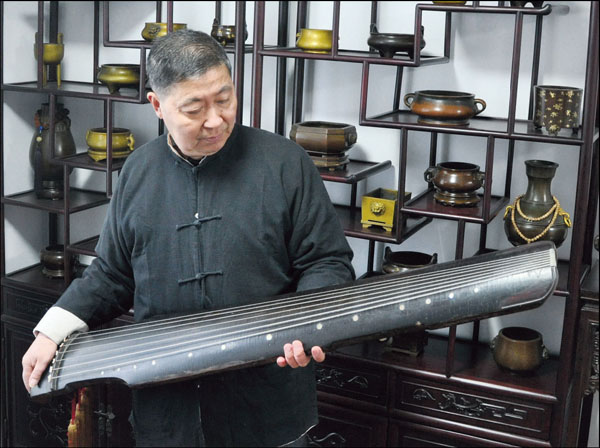 |
|
Wu Guangtong appreciates his Yu Ling Long (Exquisite Jade) guqin. (Shanghai Daily)
|
The guqin is the most noble of China's musical instruments and prices have soared, but Wang Yong says the real luxury is not the guqin itself but the tranquil and refined life it represents.
On November 19, China Guardian auctioned two modern guqin (古琴) — a traditional, seven-stringed zither — at a combined price of more than 5.8 million yuan (US$951,900), a record for the legendary instrument produced by contemporary master craftsmen. Both were made by Wang Peng, a craftsman born in 1966.
The plucked-string wooden guqin is a storied, refined instrument, favored by literati and religious figures for its subtle, ethereal sound.
Renowned as the instrument of the sages, it is famous for notes that linger, creating an air of tranquillity, detachment and reflection.
Playing guqin was one of the four attainments required of a scholar and gentleman, the others being calligraphy, painting and playing go.
One may argue that the auction price is hyped, since it's far beyond the normal price for most modern craftsmen's instruments, even those made by masters.
But the price reflects the trend of designer guqin becoming ever more expensive since 2003, when UNESCO proclaimed guqin — China's oldest stringed musical instrument with a history of more than 3,000 years — as a piece of the world's intangible cultural heritage.
Prices also rose in 2008 when the Beijing Olympics' opening ceremony began with an elegant guqin performance.
To put the trend into perspective, a piece of guqin made in the Tang Dynasty (AD 618-907) was auctioned by China Guardian in the summer of 2003 for 3.45 million yuan but in the autumn of that year a Tang guqin of equivalent quality was sold for 8.91 million yuan, also at China Guardian.
The second guqin was again auctioned in 2011 for 115 million yuan.
That followed a 2010 auction of a Song Dynasty (AD 960-1279) guqin for 137 million yuan, a record for an ancient guqin that stands today.
Prices of modern designer made-to-order guqin have also soared, more than tripling in less than a decade due to growing demand but limited supply. Only a few master craftsmen are working and they are the modern equivalent of Antonio Stradivari and his family of violin makers in the 17th and 18th centuries.
